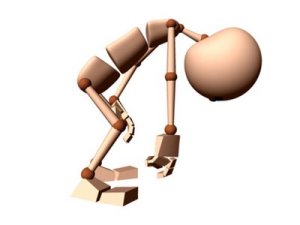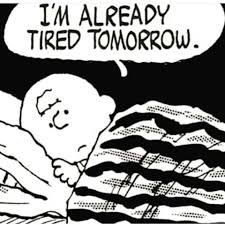All three hearing loss organizations in the US have their good points. I love my local HLAA chapter for its face to face meetings. A few weeks ago they had Susan Naidu, an audiologist at the University of Utah talk about auditory fatigue, also called listener fatigue and cognitive energy fatigue. She works with patients in the clinic, trains graduate students to become audiologists and her favorite thing to do is aural rehabilitation therapy. She was happy to talk about auditory fatigue because “it’s a very real phenomenon, it’s a real condition but it’s not discussed much and not researched enough.” It isn’t clinically recognized but many professionals are familiar with it.

Auditory fatigue doesn’t mean people are dumb because they can’t listen, it’s the “energy it takes to fulfill the complexity of listening because listening requires more to go on in your brain in order to comprehend what you’re listening to.” Ian Noon wrote about this in his piece on the Limping Chicken out of the United Kingdom only he called it concentration fatigue. Noon says: “I went to a great conference today. It was riveting and I was hooked on pretty much every word. And then I got home and collapsed on the sofa. I’m not just tired, I’m shattered. I’ve had to turn my ears off to rest in silence and my eyes are burning. I’ve also had about 3 cups of tea just to write this paragraph.”
Susan introduced us to Kathleen Fuller’s work on hearing loss and cognitive energy. Kathleen asks: “How can audiologists better understand and find ways to counteract the factors underlying why listeners may decide to quit participating in activities because it takes too much effort to listen? How can audiologists help listeners to strategically deploy their available cognitive capacity in situations where it is hard to listen? How can audiologists prevent listeners from avoiding situations and withdrawing from social participation because it is too hard to listen?… It’s said we hear with our ears and listen with our brain now we add when and how much effort we expend during listening in everyday life depends on our motivation to achieve goals and attain rewards of personal and/or social value.”
Listening takes effort. It’s not only being able to hear but being able to pull all the components together to communicate properly. It’s being able to understand language, generating an appropriate response and being able to keep it going back and forth to make a conversation. Usually people aren’t just listening either, they are multitasking; washing the dishes, walking, watching TV, etc.
For those with hearing loss it takes even more effort. Not only are they taking in the above but they are trying to decode the message. Add in being visually aware to compensate such as speechreading and body language. The mind races to fill in blank spots in words and conversations which involves guess work. The mental process is “I’m not hearing well enough. I have to do something and physically push the brain to listen better.” After an hour (or less) these people are really tired and experience discomfort, pain and numbness.
What makes listening even more difficult? Noise, it’s the number one complaint for those coming into Susan’s clinic. Trying to filter and ignore noise makes listening harder for hearing people and difficult for the hard of hearing. Even with modern technology in hearing aids such as directional microphones and noise reduction programs noise remains a problem. Restaurants are an example, bars and traffic. (Hearing in cars has never been easy!)
What other things become hard with this much cognitive energy being spent? Remembering things get harder because with so much going on in the mind already, it’s hard to find a place to stash the information. People may have a hard time remembering names because there’s more focus to understand what’s being said. While in a meeting they can be so intent on understanding the words as they are being said that half the meeting information is forgotten.
Because of the intense concentration, hard of hearing employees end up taking more days off. The mental stress affects their bodies causing illness among some. Or to balance out, they stay home evenings and weekends to recuperate, avoiding social activity. For those who don’t work, many tend to withdraw because it’s too much work going to that party, the play or lecture. It’s easier to stay home and watch TV with captions. It’s not worth it in the end, the struggle is too much.

Mohan Matthen is studying why some hard of hearing people are more successful at socializing than others. He thinks it might be a pleasure factor. When audiologists diagnose hearing loss and fit people with hearing aids they tend to talk about adverse conditions. What if they talked about positive things instead? If a person can exhibit more pleasure in the role of listening they might be more relaxed and less stressed out. Once it becomes pleasurable their listening effort seems to be reduced. No matter how hard it seems, seek listening enjoyment. Make it fun and shoot for positive because the reward will be “I will understand.”
So what helps combat this fatigue?
Advocating helps a great deal. What do you need to make this meeting better? CART (live captioning)? Sitting closer to the presenter? Assistive listening devices? One speaker at a time? Don’t talk while multitasking? There’s a lot to be said for planning ahead as well. Think about the environment, talk to the event coordinators, find out if the venue has assistive listening devices such as the CaptiView at theaters or live captioned performances. If you’re going to a lecture/workshop/convention, talk to those in charge well in advance to see what might be set. Some people report learning speechreading has helped lighten their fatigue. Visiting with people a few at time instead of large groups. Limit interruptions, have a quiet room to talk to family members at large gatherings. Ask for background noises (music or TV) to be turned down or off. Go outside to eat because break rooms usually have lousy acoustics. Take hearing breaks and read instead of watching TV. Arrange for hand signals when conversation needs to be slowed down or when wanting someone to talk louder. Find out what works for you and advocate for yourself. It’s okay to experiment with it all.
The presenter validated what most of feel almost daily, I’m so glad I attended. I don’t shy away from social situations often, I even attend noisy ones without much thought although occasionally I refuse to go because I’m already tired. If I’m that tired I’ve learned from experience I won’t have the energy needed to make the best of the situation staying home instead. Knowing when not to venture out has saved me a few meltdowns.
I also know when to get CART, when ALDs will work, or not, and it’s even helped to know I’ll fail from time to time. I now analyze my bad times to find ways to make it better next time.
Advocating for myself has made a tremendous difference in my social pleasure. I tell people up front I lipread, they need to face me or get my attention before talking. Most people are good and will comply and some very interesting conversations have followed.
More links on auditory fatigue.
Studies done on prolonged exposure to audio stimulus (for those who want to go deeper). This phenomenon occurs after an extended period of time listening to speech and happens to hearing people as well. Hearing people have more problems than expected which might be related to an auditory processing disorder. Susan said those with hearing loss all have auditory processing disorders.
Richard Gurgel is studying the relationship of hearing loss and dementia. Are individuals with diagnosed mild dementia experiencing decline in auditory processing? Older individuals who have hearing loss but didn’t have hearing aids showed improvements once aided, not just in quality of life but in skills. People were thinking they had dementia when they didn’t.
Starkey on listening fatigue.
Amplification study. Amplification has limited improvement for those with a steep slope high frequency hearing loss.
Susan recommends the LACE (Listening And Communication Enhancement) Program, it improves listening skills.
More publications by Mohan Matthen on hearing loss and displeasure.

Thanks – a great article and so wonderful that auditory fatigue is recognized.
Yes, nice to have it validated!
Pingback: Social butterfly | hear.here.